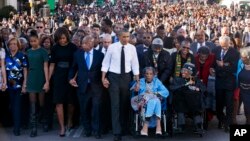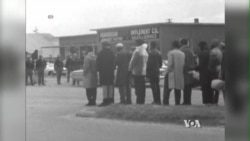Thousands massed at a bridge in the southern U.S. town of Selma, Alabama Sunday to remember and reflect on the sacrifices of another crowd that gathered at the same bridge half a century ago on a day that came to be known as "Bloody Sunday."
Many came from around the country this weekend for several events commemorating the event.
Police beat and tear-gassed marchers at the foot of the bridge in Selma on March 7, 1965 when they tried to march from Selma to Montgomery in support of voting rights for all races.
Two weeks after that day, civil rights leader Martin Luther King, Jr. led a successful Selma-to-Montgomery march. The demonstrations helped spark the Voting Rights Act of 1965, prohibiting discrimination based on race.
U.S. Attorney General Eric Holder praised the 1965 activists for their bravery in the fight for voting rights. "With the relentless drumbeat of their footsteps," Holder said, "they awoke the conscience of the nation, and they bent the arc of the moral universe a little further towards justice."
On Saturday, President Barack Obama marked the anniversary with a call to Americans to work together to make the country better.
While acknowledging that the race for equal opportunity "is not yet won," Obama - the nation's first African American president - told thousands gathered in Selma that he rejects the notion that nothing has changed.
The anniversary comes as the U.S. struggles with renewed racial tensions over police treatment of African Americans. Much of the focus has been on the town of Ferguson, Missouri where a white police officer shot and killed unarmed black teenager Michael Brown last year during a street confrontation.
But Obama said a Justice Department report this week concluding police in Ferguson have routinely violated black citizens' rights does not erase the nation's progress.
"What happened in Ferguson may not be unique, but it is no longer endemic, it is no longer sanctioned by law or by custom, and before the Civil Rights Movement, it most surely was," Obama said. He called on Americans of all races to make the effort to ensure the U.S. criminal justice system "serves all and not just some.
"Together, we can raise the level of mutual trust that policing is built on - the idea that police officers are members of the community they risk their lives to protect, and citizens in Ferguson and New York and Cleveland, they just want the same thing young people here marched for 50 years ago - the protection of the law," he said.
On the flight from Washington to Selma Saturday, Obama awarded the Congressional Gold Medal to the marchers whom he called "foot soldiers" that participated in the two marches.
Obama's wife, Michelle, and daughters, Malia and Sasha, also were present at Saturday's event, as well as Obama's predecessor, George W. Bush, and his wife, Laura.
Also in attendance: Congressman John Lewis, a leader of the 1965 Bloody Sunday march who was severely beaten himself. Lewis addressed the crowd before Obama, after previously expressing disappointment that Republican congressional leaders would be absent from the commemoration.
Last November, heated protests erupted in the St. Louis suburb of Ferguson and across the country, after a grand jury cleared the officer charged in Michael Brown's death. Adding to the nationwide outcry were several other high-profile incidents, including the police chokehold death of a black man in New York.
Some information for this report comes from AP and Reuters.







